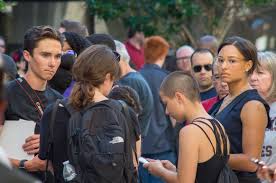10 Things We Know About Those Making Death Threats Against the Parkland Survivors

Editor’s note: This was written back in February. I don’t know why I never hit Publish. Unfortunately, even the Parkland activists—as amazing and powerful as they are—even the mass rallies they organized, even the wide public outcry—has not ended the violence even at schools yet, though they’ve already made more progress than anyone has ever done on this issue. In Arizona alone, there were 17 shooting threats (not actual shootings) just between Valentine’s Day and March 10th. I hope their activism sparks a massive rejection in November of guns-uber-alles politicians.
Meanwhile, just in the past week, we’ve seen a merchant of hatred, the always-despicable Milo Yiannopoulos, call for “vigilantes” to attack journalists. Yiannopoulos was forced to backpedal, but this is getting even uglier. The crazies will take this stuff seriously. We’ve also seen consistent, repeated attacks against the press by the current occupant of the Oval Office. And we’ve seen a mass shooting inside a newspaper newsroom in Maryland. Everything Kropotkin says below about people who make death threats against child activists is true of those who attack journalists, too, and thus this post is more relevant than ever. Remember: when dictators take over, they start restricting the press.
Guest Post By Pyotr Kropotkin
In the wake of the horrible (and so could-have-been-avoided) shooting at Marjory Stoneman Douglas High School in Parkland, Florida, several of the surviving students have spoken out. In this short time, they’ve shown themselves as articulate spokespeople for common sense, and they are changing the conversation around the right to own any type of weapon versus the right to personal and public safety.
But despite the incredible trauma they’ve been through, quite a few people don’t think they should be speaking out. Some are even making death threats against these kids!
If you are making death threats against people just because you disagree with them, here are some of the things we know about you:
- Somewhere along the way, you lost your compassion, lost your heart
- You don’t understand the difference between freedom to and freedom from—that your freedom to shoot an assault rifle ends when it impinges on others’ freedom from attack
- You are mentally or emotionally unbalanced and should not have access to firearms, because you’ve made a death threat against an innocent child who has done you no harm
- You should be the subject of immediate criminal investigation, for threatening the life of another
- You don’t love the Constitution—the 2nd Amendment is fine for you, but not the 1st Amendment, which protects the rights of free speech, free assembly, worship, and petitioning the government to redress grievances
- You probably believe that an armed presence is a deterrent to violence—even though an armed deputy was outside Stoneman High, and even though the majority of people at Fort Hood the day of that massacre were armed
- You might also believe that there’s some crazy government conspiracy to take away your guns so they can take away the rest of your freedom—even though even an assault rifle is no protection against tanks and howitzers
- You like to feel powerful, and you think your assault rifles and your threats make you powerful (they don’t—they make you the equivalent of a two-year-old at playtime)
- You’re a bully who thinks the way to succeed is by throwing your weight around and scaring other people
- You probably have not experienced enough love in your life—and I feel sorry for you.
